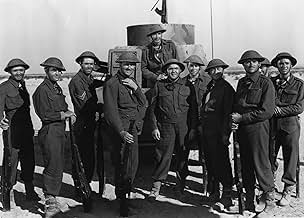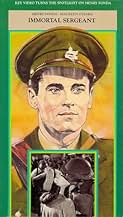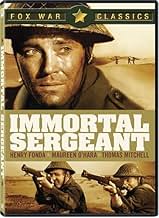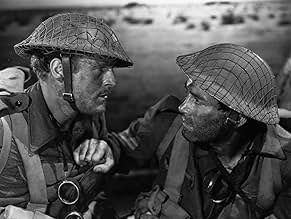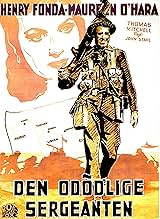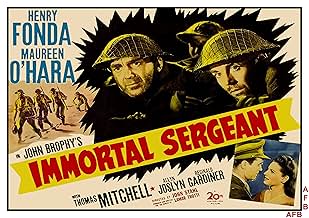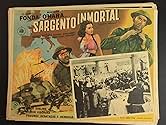AVALIAÇÃO DA IMDb
6,6/10
1,1 mil
SUA AVALIAÇÃO
Adicionar um enredo no seu idiomaDuring a WW2 patrol in the North-African desert, a Canadian corporal reminisces about his sweetheart and must lead his platoon when the sergeant gets wounded.During a WW2 patrol in the North-African desert, a Canadian corporal reminisces about his sweetheart and must lead his platoon when the sergeant gets wounded.During a WW2 patrol in the North-African desert, a Canadian corporal reminisces about his sweetheart and must lead his platoon when the sergeant gets wounded.
- Direção
- Roteiristas
- Artistas
- Prêmios
- 3 vitórias no total
John Banner
- Officer
- (não creditado)
Wilson Benge
- Waiter
- (não creditado)
Ted Billings
- Man at Train Depot as Soldiers Return
- (não creditado)
Lane Bradford
- Returning Soldier
- (não creditado)
James Carlisle
- Party Guest
- (não creditado)
Gordon B. Clarke
- Soldier
- (não creditado)
Ruth Clifford
- Nightclub Patron
- (não creditado)
James Craven
- NCO
- (não creditado)
Oliver Cross
- Nightclub Patron
- (não creditado)
Jack Deery
- Party Guest
- (não creditado)
- Direção
- Roteiristas
- Elenco e equipe completos
- Produção, bilheteria e muito mais no IMDbPro
Avaliações em destaque
Some films age well, while others get noticeably worse over the years. This film falls into the second category. First, we are asked to believe that Henry Fonda is British; please. Then, we have to subjected to Thomas Mitchell, one of the worst character actors in the history of film. He always played a mischievous Irishman; how creative.
Fonda is always good; regardless of his vehicles in film and Sullivan is believable (but not as a Brit).
The production crew made a few mistakes; like the desert being sweaty at night; it is cool in the desert at night, and unbearingly hot in the day.
This leads to a few other holes in the plot. After the crew attacks and kills a German crew, why didn't they take THEIR food and water? Duh.
Second error. Why not kill the Germans while they are sleeping instead of foraging for food and water? They would have been a lot easier to kill sleeping, rather than awake and walking around with their weapons. Sorry, no sale. Had very little to do with real desert warfare.
Fonda is always good; regardless of his vehicles in film and Sullivan is believable (but not as a Brit).
The production crew made a few mistakes; like the desert being sweaty at night; it is cool in the desert at night, and unbearingly hot in the day.
This leads to a few other holes in the plot. After the crew attacks and kills a German crew, why didn't they take THEIR food and water? Duh.
Second error. Why not kill the Germans while they are sleeping instead of foraging for food and water? They would have been a lot easier to kill sleeping, rather than awake and walking around with their weapons. Sorry, no sale. Had very little to do with real desert warfare.
Low-budget film with the sole purpose of serving as war propaganda for the entire Allied side. The protagonist, an antihero due to his wartime experience, unwittingly and subsequently consciously transforms into a hero. What a more fantastical transformation, when in reality, war often produces exactly the opposite. But well, any ammunition is necessary in the war effort, and what better ammunition than young volunteers, deceived by unfiltered and unscrupulous propaganda.
Well, but this veiled or blatant propaganda seems inevitable for any war-themed film production; you know it, and you have to deal with it.
Cinematographically speaking, the film barely passes with so little money; there are no visual resources for more than a desert as the main setting and the night that conceals everything, flaws included. Narratively, everything is focused on the film's main mission, so no one in the production has made an effort to offer more. Even Fonda, who accepted this supporting role, later regretted it in his biography.
But well, the only thing that saves it is that classic cinema has its charm, a mixture of black and white drama, close-ups that few actors today can endure, and that aura of times past, which in the collective imagination is mistakenly always considered better. Another interesting aspect not to forget is that the film is contemporary to the events narrated, and for war genre enthusiasts, it's always a pleasure to be able to enjoy them, even though it's impossible not to think that while some were giving their lives, fighting in battles or under the oppressive yoke of the occupying enemy, others could indulge in the magical world of the seventh art.
Well, but this veiled or blatant propaganda seems inevitable for any war-themed film production; you know it, and you have to deal with it.
Cinematographically speaking, the film barely passes with so little money; there are no visual resources for more than a desert as the main setting and the night that conceals everything, flaws included. Narratively, everything is focused on the film's main mission, so no one in the production has made an effort to offer more. Even Fonda, who accepted this supporting role, later regretted it in his biography.
But well, the only thing that saves it is that classic cinema has its charm, a mixture of black and white drama, close-ups that few actors today can endure, and that aura of times past, which in the collective imagination is mistakenly always considered better. Another interesting aspect not to forget is that the film is contemporary to the events narrated, and for war genre enthusiasts, it's always a pleasure to be able to enjoy them, even though it's impossible not to think that while some were giving their lives, fighting in battles or under the oppressive yoke of the occupying enemy, others could indulge in the magical world of the seventh art.
This is the first American film about the North Africa campaign and the last film Henry Fonda made before reporting for the war. In fact he had tried to report earlier but studio head Zanuck had him deferred until this film was made.
"The Immortal Sergeant" tells the oft-told tale of a group of soldiers at risk trying to survive. The first version I can recall was "the Lost Patrol" a 1929 British silent film remade in 1934 by John Ford. Those films were based on the 1927 novel "Patrol" and the basic theme has been repeated since (e.g., 'The Thirteen", "Sahara", "Last of the Comanches", "Kokoda").
This 1943 film is an American propaganda film using the British fighting in Africa for the setting. Though this is obviously a studio film, the camera work is pretty good and some of the action sequences look good.
The cast is rich with 40s stars like Henry Fonda, Thomas Mitchell, Maureen O'Hara, and Reginald Gardiner. But they are merely going through the motions and there is nothing here you haven't seen before.
My favorite WW 2 fighting films made between 1942 and 1944 include "Wake Island" (1942), "Bataan" (1943) which also had Mitchell, "The Fighting Sullivans" (1944), "Flying Tigers" (1942), "Guadalcanal Diary" (1943), "The North Star" (1943), "The Rats of Tobruk" (1944), and "Thirty Seconds Over Tokyo" (1944).
There are a plethora of non-fighting WW 2 films that are worthy of mention – "Casablanca" (1942), "Lifeboat" (1944), "Hangmen Also Die" (1943), and "Five Graves to Cairo" (1943).
"The Immortal Sergeant" tells the oft-told tale of a group of soldiers at risk trying to survive. The first version I can recall was "the Lost Patrol" a 1929 British silent film remade in 1934 by John Ford. Those films were based on the 1927 novel "Patrol" and the basic theme has been repeated since (e.g., 'The Thirteen", "Sahara", "Last of the Comanches", "Kokoda").
This 1943 film is an American propaganda film using the British fighting in Africa for the setting. Though this is obviously a studio film, the camera work is pretty good and some of the action sequences look good.
The cast is rich with 40s stars like Henry Fonda, Thomas Mitchell, Maureen O'Hara, and Reginald Gardiner. But they are merely going through the motions and there is nothing here you haven't seen before.
My favorite WW 2 fighting films made between 1942 and 1944 include "Wake Island" (1942), "Bataan" (1943) which also had Mitchell, "The Fighting Sullivans" (1944), "Flying Tigers" (1942), "Guadalcanal Diary" (1943), "The North Star" (1943), "The Rats of Tobruk" (1944), and "Thirty Seconds Over Tokyo" (1944).
There are a plethora of non-fighting WW 2 films that are worthy of mention – "Casablanca" (1942), "Lifeboat" (1944), "Hangmen Also Die" (1943), and "Five Graves to Cairo" (1943).
"Immortal Sergeant" was apparently not one of Henry Fonda's favorite film roles. I am not sure why "The Big Street" wasn't his least favorite (it was god-awful, believe me) but he disliked it. And, I might add, my wife wasn't super-fond a this film as we watched it. However, I really thought it was pretty good...though I do wonder if the main character played by Fonda might have been schizophrenic--that's because throughout the film he keeps hearing the voice of his sergeant--even though the guy is dead!
The film is a WWII propaganda film. Because of this, it's main thrust is NOT realism but to bolster folks' support of the war effort. I cut the film a bit of slack, as it was 1943 and keeping up morale was a major concern. What I didn't like was the casting of Fonda, as he was supposed to be a Brit--and seemed about as British as John Wayne or Hattie McDaniel! In this sense, I could see why he didn't like playing this role--but the plot is pretty good and more than makes up for this.
The sergeant in the title is played by Thomas Mitchell--and he's very good in this role. This guy is a career soldier and seems indestructible to his men--and he is adored by them. However, although he seems to have all the answers, his corporal (Fonda) seems quite different--unsure of himself and not at all the soldier Mitchell is. But, when the sergeant is killed and Fonda is left in charge of a small group of men in the North African desert, he's given a chance to show his mettle.
In many ways, this film is a lot like the film "Sahara"--though "Sahara" is a much more enjoyable (and less realistic) film. Both are set in the same locale and are about a small group of soldiers overcoming greater numbers of enemy soldiers. But the casting and script just weren't quite as good here--though the film STILL is enjoyable and did what the studio wanted it to do. I also appreciate how the men in this film were NOT indestructible--many died even though you KNEW how it all had to end. Not brilliant but quite entertaining.
The film is a WWII propaganda film. Because of this, it's main thrust is NOT realism but to bolster folks' support of the war effort. I cut the film a bit of slack, as it was 1943 and keeping up morale was a major concern. What I didn't like was the casting of Fonda, as he was supposed to be a Brit--and seemed about as British as John Wayne or Hattie McDaniel! In this sense, I could see why he didn't like playing this role--but the plot is pretty good and more than makes up for this.
The sergeant in the title is played by Thomas Mitchell--and he's very good in this role. This guy is a career soldier and seems indestructible to his men--and he is adored by them. However, although he seems to have all the answers, his corporal (Fonda) seems quite different--unsure of himself and not at all the soldier Mitchell is. But, when the sergeant is killed and Fonda is left in charge of a small group of men in the North African desert, he's given a chance to show his mettle.
In many ways, this film is a lot like the film "Sahara"--though "Sahara" is a much more enjoyable (and less realistic) film. Both are set in the same locale and are about a small group of soldiers overcoming greater numbers of enemy soldiers. But the casting and script just weren't quite as good here--though the film STILL is enjoyable and did what the studio wanted it to do. I also appreciate how the men in this film were NOT indestructible--many died even though you KNEW how it all had to end. Not brilliant but quite entertaining.
In his memoirs Henry Fonda hated this film above all others that he did in his career. That's taking in quite a bit of territory because Fonda did some dreadful stuff in the seventies like Tentaccoli with a giant octopus. A lot of this was done for the money and Fonda with five wives certainly had much expenses in alimony.
But Immortal Sergeant held a place dear in his heart because of the head of 20th Century Fox, Darryl F. Zanuck. Back in 1940 in order to get the part of Tom Joad, Fonda made a faustian deal with Zanuck signing his only studio contract. The studio cast him in what he considered junk. The good films he made in that four year stretch were on loan out, to Paramount for The Lady Eve, to Warner Brothers for The Male Animal, to RKO for The Big Street. He was not fond of what Fox cast him in for the most part because he got what was left after Tyrone Power and Don Ameche rejected it.
Anyway come 1943 Fonda had two objectives, to make The Oxbow Incident because he knew that would be a classic and to enlist in World War II as pal Jimmy Stewart did. He prevailed on Zanuck to do The Oxbow Incident and it was a cheaply made western, classic though it was because it was shot completely on the sound stage.
Then Zanuck cajoled, begged, and pleaded with him to make this one more film which he said was a great propaganda piece one that would tear the hearts of the movie going public and rally the homefront and be an inspiration to the fighting troops.
When Immortal Sergeant proved somewhat less than that, Fonda felt hoodwinked and gritted his teeth and finished the film. He tried in fact to enlist to get out of it and Zanuck had so much pull in Washington, DC, Fonda kept getting his enlistment postponed.
It was one angry Henry Fonda who finished The Immortal Sergeant and then went to war. His experience with this film made him bound and determined to get out of his contract one way or another. Ultimately he left Hollywood in 1948 when he got a great Broadway role in Mister Roberts. Fonda didn't return to Hollywood until 1955 and then to make the screen version of Mister Roberts.
But that's getting away from Immortal Sergeant. Without Henry Fonda's rather colored viewpoint of the situation let me say it's not the worst World War II flag waver the studios put out. As is usual Henry Fonda is a Canadian to explain his non-British speech who has enlisted in the British army and is serving in North Africa. He's a young man with a lot of angst and when his patrol's sergeant is killed, Fonda has to summon something from within to bring the men back to their lines.
Thomas Mitchell is the sergeant and Maureen O'Hara is Fonda's girl back home and both do a creditable job.
For the rest of his life Fonda would foam at the mention of Immortal Sergeant. Being the professional he was, he did a good job in the film.
But Immortal Sergeant hardly belongs in the same company as The Oxbow Incident and Mister Roberts in the works of Henry Fonda.
But Immortal Sergeant held a place dear in his heart because of the head of 20th Century Fox, Darryl F. Zanuck. Back in 1940 in order to get the part of Tom Joad, Fonda made a faustian deal with Zanuck signing his only studio contract. The studio cast him in what he considered junk. The good films he made in that four year stretch were on loan out, to Paramount for The Lady Eve, to Warner Brothers for The Male Animal, to RKO for The Big Street. He was not fond of what Fox cast him in for the most part because he got what was left after Tyrone Power and Don Ameche rejected it.
Anyway come 1943 Fonda had two objectives, to make The Oxbow Incident because he knew that would be a classic and to enlist in World War II as pal Jimmy Stewart did. He prevailed on Zanuck to do The Oxbow Incident and it was a cheaply made western, classic though it was because it was shot completely on the sound stage.
Then Zanuck cajoled, begged, and pleaded with him to make this one more film which he said was a great propaganda piece one that would tear the hearts of the movie going public and rally the homefront and be an inspiration to the fighting troops.
When Immortal Sergeant proved somewhat less than that, Fonda felt hoodwinked and gritted his teeth and finished the film. He tried in fact to enlist to get out of it and Zanuck had so much pull in Washington, DC, Fonda kept getting his enlistment postponed.
It was one angry Henry Fonda who finished The Immortal Sergeant and then went to war. His experience with this film made him bound and determined to get out of his contract one way or another. Ultimately he left Hollywood in 1948 when he got a great Broadway role in Mister Roberts. Fonda didn't return to Hollywood until 1955 and then to make the screen version of Mister Roberts.
But that's getting away from Immortal Sergeant. Without Henry Fonda's rather colored viewpoint of the situation let me say it's not the worst World War II flag waver the studios put out. As is usual Henry Fonda is a Canadian to explain his non-British speech who has enlisted in the British army and is serving in North Africa. He's a young man with a lot of angst and when his patrol's sergeant is killed, Fonda has to summon something from within to bring the men back to their lines.
Thomas Mitchell is the sergeant and Maureen O'Hara is Fonda's girl back home and both do a creditable job.
For the rest of his life Fonda would foam at the mention of Immortal Sergeant. Being the professional he was, he did a good job in the film.
But Immortal Sergeant hardly belongs in the same company as The Oxbow Incident and Mister Roberts in the works of Henry Fonda.
Você sabia?
- CuriosidadesAccording to TCM's Robert Osborne, this was the last film Henry Fonda worked on before enlisting in the U.S. Navy during World War II.
- Erros de gravaçãoWhen the survivors come across the vehicle tracks after the attack on the Italian armoured car, multiple shadows of the soldiers can be seen, indicating multiple light sources.
- Citações
Sgt. Kelly: Drinking water is the worst thing in the world for a wound like mine.
[in the groin]
- ConexõesEdited into All This and World War II (1976)
- Trilhas sonorasThe Campbells Are Coming
(uncredited)
Traditional
Played on the bagpipes at the beginning
Principais escolhas
Faça login para avaliar e ver a lista de recomendações personalizadas
- How long is Immortal Sergeant?Fornecido pela Alexa
Detalhes
- Tempo de duração1 hora 31 minutos
- Cor
- Proporção
- 1.37 : 1
Contribua para esta página
Sugerir uma alteração ou adicionar conteúdo ausente

Principal brecha
By what name was O Sargento Imortal (1943) officially released in India in English?
Responda

